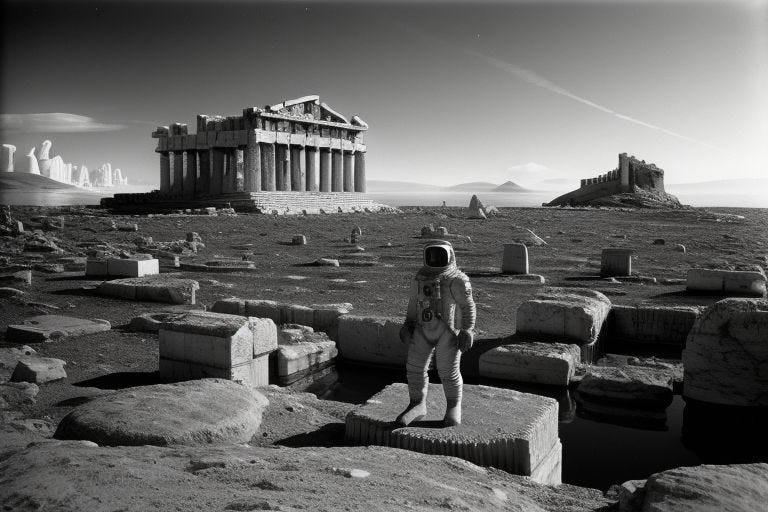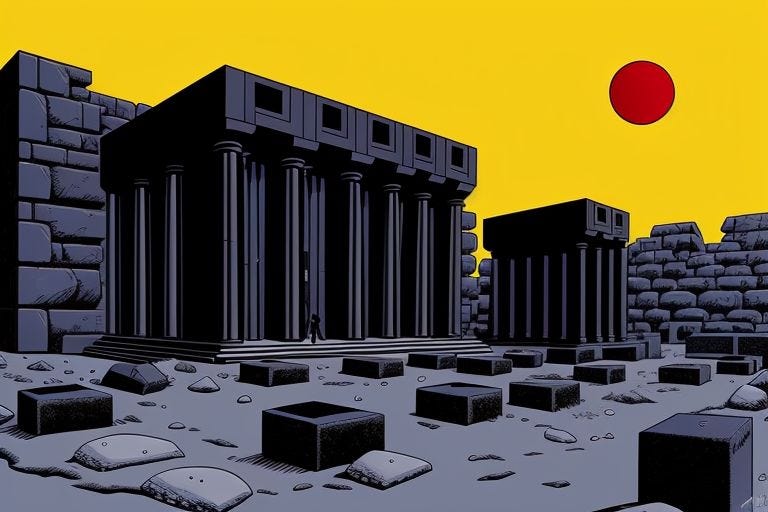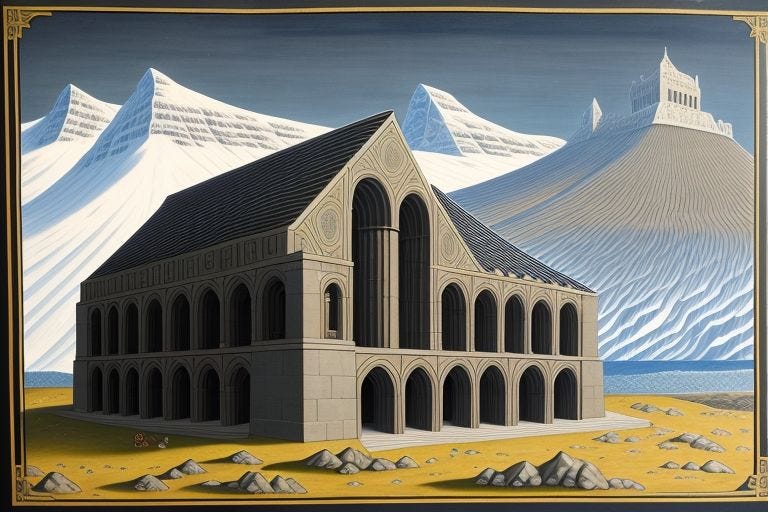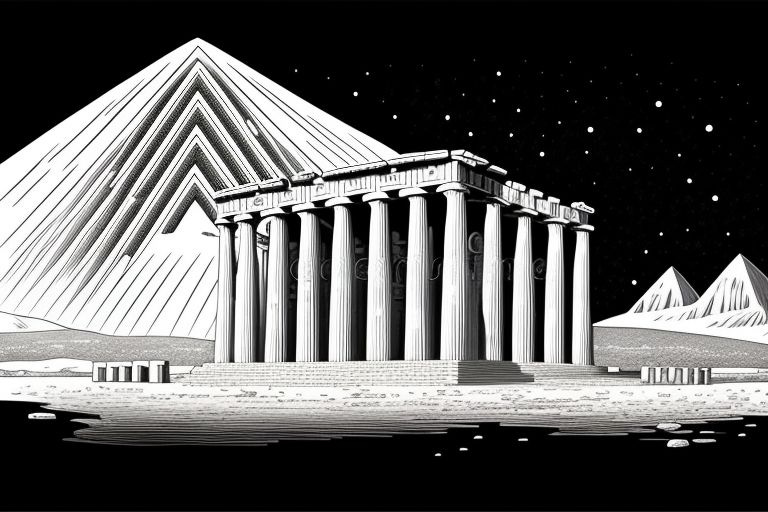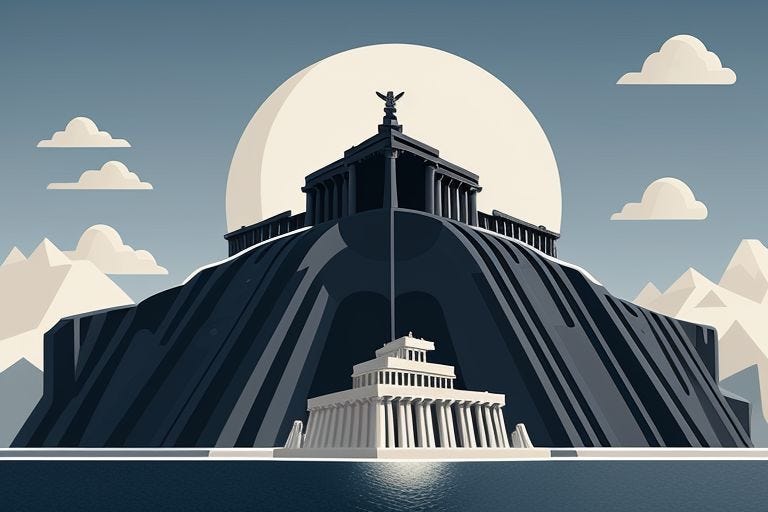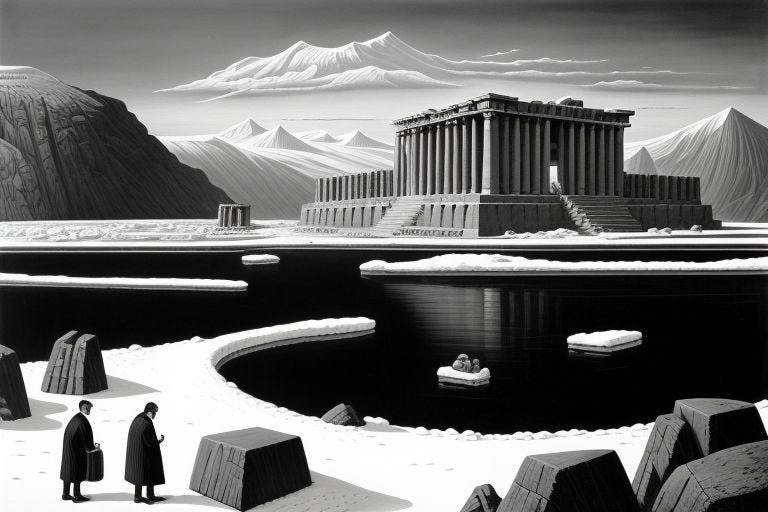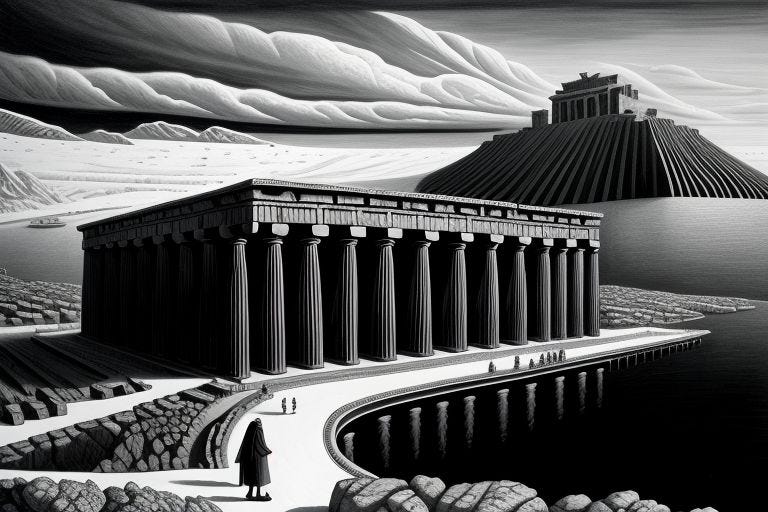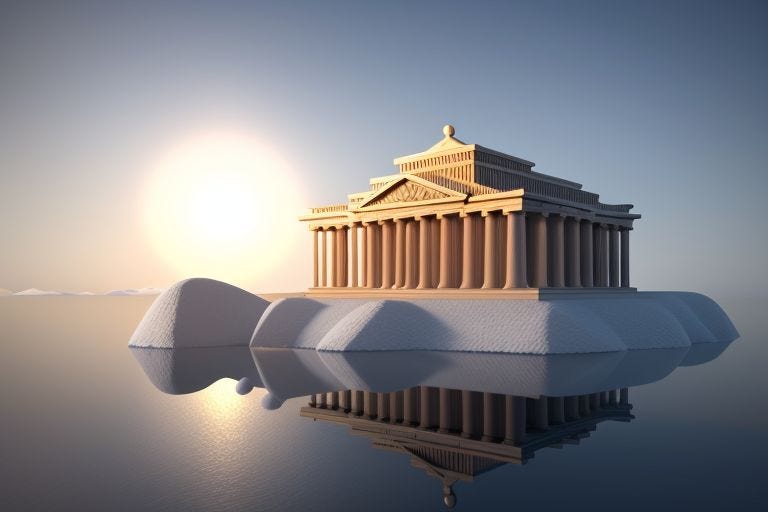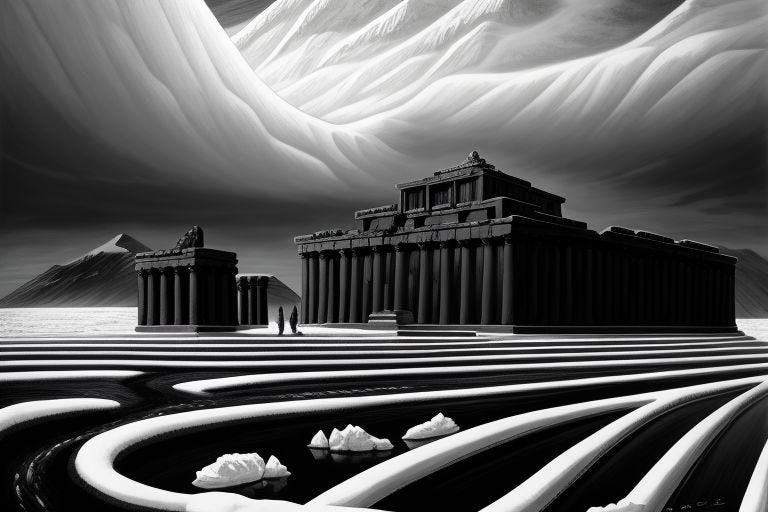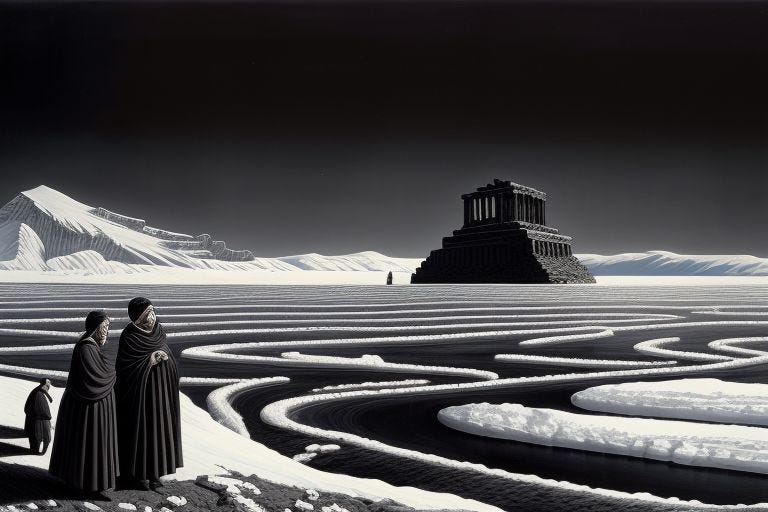Communism is supposedly the most brutal form of government. Gigantic concrete buildings, military parades, bread lines, purges. Could a more brutal form exist, a state which does not base its existence on the needs of the people?
The Aztecs seem to have incarnated a further form of totalitarianism. A group of Gods, desiring blood, reign terror on the populace. Yet even this is justified, to prevent famine, to provide rain for crops, to prevent earthquakes. It is always populist utilitarianism which supports the state, even the most primitive, spiritual, and violent. An aristocracy in spirit would somehow transcend this. And perhaps this is represented by the Spartans with their Helots. To tell the people openly, “this is not for you. You exist to serve something higher.”
In this sense, even Christianity has some aristocracy of spirit. Yes, it demands the abolition of wealth to aid the poor, it unites all tribes under one banner, it seeks the salvation of souls. But Christianity allows for the glory of the church above all worldly concerns. The people live in huts, while the church is golden. Such an ethos has an anti-populist element: the state does not exist for utilitarian reasons, to serve the people, but to glorify God.
Can such a state exist today? Between the forces of communism, democracy, and even fascism all appeal to the health of the people, the wealth of the people, the happiness of the people. The state engages in a dance of seduction with the people. The people are like ripe fruit, waiting to be fooled. They are a gullible host, waiting to be led. The people are seduced by the state, and they seduce the state into seducing them. It is a mutual attraction around the concept of the marriage of the people with the state — Rousseau’s General Will.
All of this depends on the priestly foundations of the state, which existed in the beginning and continue till this day. The only possible exception or deviance from this scheme is in the power of war. In war, man contends not with the powers of seduction, but in the powers of force.
Were a greater species to dominate man and bend our species to its will, the General Will of the majority would no longer provide the foundation of the state. However, in order for this alien species to work together, to form its own state within a state, it must appeal, at some point, to a general will among beings. Non-human do not eliminate the problem of populism. Collective selfishness is the foundation of all collective action. True idealism in the highest sense, which is the sacrifice of the individual for God, for the highest beauty, is not a possible foundation for a state.
However, idealism can be introduced in degrees according to the liberty of the state from pure utilitarianism. Any state which is judged according to these criteria will gamble or risk everything for such a liberation. Small and petty states will always be bound to the logic of larger states. Only when a state has insulated itself against foreign domination does it have the freedom from utility in order to pursue beauty.
Utility serves the needs of the moment, the apparent, and the obvious. Every citizen will complain about life's petty issues: the criminality of neighbors, the price of goods, the cleanliness and timeliness of services. If beauty is thought of as something arbitrary, and utility is thought of as definite, pragmatic, and realistic, then the problem becomes apparent.
A state which bends or even responds to the aesthetic sensibility of the masses over which it rules cannot ever attain a visionary or transcendent beauty. Beauty is always at war with what is common. Beauty sometimes manifests as an excess of wealth; at other times, it is an absence of humanity in favor of severe limitation, as in the preservation of wild nature. The gardens of Versailles, from which the mowed lawn derives, had no practical purpose.
Those elements seeking an aesthetic state rather than a pragmatic state must first contend, not with the people themselves, but with their seducers. The religious, the rabble rousers, the activists, journalists, humanitarians, demagogues, community organizers, preachers, moralists, and priests.
Marx imagined that Socialism would first manifest as a dictatorship of the proletariat, in which the working class would seize the means of production and bend them toward the General Will. The rich capitalists would be destroyed, and their wealth divided up and distributed equally among the masses. Finally, after all class distinctions were eliminated, the state would "wither away," since the enlightened population would carry on in total equality as a matter of instinct without the need for state intervention.
If the concerns of the people are not only seen as irrelevant, but the greatest danger to the aesthetic state, then what must "wither away" is every form of equality. In this sense, the state must embrace nihilism, or a total disregard for all the matters of pragmatism. This begins from an ahistorical approach. Whatever is the basis of the collective identity of the "people" must be undermined and subverted. The people are no longer an organic whole, but an infinite variety of individuals, each with different interests.
It is this "divide and conquer" strategy which reduces a dangerous mass into a diffuse powder. Whatever is the central doctrine, the strongest point of resistance must be attacked first, and anything which is secondary or deviant can become an ally in this cause.
The problem formulated so far is as follows: how does the state maintain its own security and erode the public religion if it is always threatened by this religion? With what support does the state protect itself? As for the members of the state, under what common goals are they constituted?
A desire for beauty, and beauty alone, without any sense of collective or pragmatic interest, is perhaps explored esoterically by Plato. What does it mean to run the state well, while at the same time, not bowing to whatever traditional concerns have restrained it? In the service of the state, Plato recommends new myths and noble lies — in other words, religions which are controlled by the state, and therefore more amenable to the freedom of the state.
In the case of America, all of the religious powers which oppose an aesthetic liberty are most concentrated in those elements dedicated to the poor, to the downtrodden, to the suffering, the disabled, the left behind. Against these stands the interests of the middle class, which finds itself as the first mass distinguishable from the lowest of society, yet still in large enough numbers to oppose this lowest strata.
From this vantage point, the terms "middle" and "lower" are entirely relative and unstable. If the lower class is diminished, either physically or morally, then new fractures appear among the middle class. This species then divides itself into "middle" and "lower" again.
Can such a process take place? In modern times, states are global in scope, and must continuously exercise their influence beyond their borders. Accordingly, the diminishment of the lower strata, when aligned with the need for external expansion, results in the policy of exile and emigration. An opposite of this policy would be "brain drain," the flight of the higher strata.
The opposite concept, that of "brain gain," with mass immigration in the form of skilled or credentialed labor, poses certain threats to the stability of the state. If the state is truly composed of a small dedicated core seeking the abolition of practical concerns, it can only succeed if it is unopposed and has total dominion over the state. The importation of new elite populations, however practically productive they may be, will dilute and contest this supremacy. Although it seems paradoxical, a Vivek Ramaswamy can invade America, learn the language of populism, and present himself as a defender of the "founding fathers." The paradox of such a confidence game is lost on the masses. So it was in Rome that Christians from the Levant gradually infiltrated the halls of power and presented themselves as men of the people.
At present, America is not governed by an aesthetic core. If the core at present is moralistic, populist, democratic and pragmatic, can that core be dislodged by foreign, hostile elements? Or will this merely replace one group of utilitarians with another?
If an aesthetic core is not present, then replacing a native core with a foreign moral core is no remedy. The cultivation of an aesthetic core, understood to be idealistic, comes from those who are the least concerned with practical matters, and the most willing to confront force. The Christian martyrs give one example of an elite willing to die for a cause. However, the Christian aesthetic sensibility was turned away from the aristocratic Greek ideal, and turned towards the lower strata as the "salt of the earth."
If Christianity was a deviation from the original aesthetic core of Greek civilization, the question remains, what founded that core? If such a core could be founded in Greece, could it be founded in America? In the case of Greece, the aristocracy was concerned chiefly with the breeding of beauty as a way of life. The story of the spotted sheep in the Bible (Jacob or Isaac) indicates a pastoral preoccupation with the physical health of animals. The Greek laurel, the crown or wreath, symbolized the Greek love of flowers and gardening. Finally, the Olympic games were a chance for the Greeks to compete for the physical health of the human body.
The Greek preoccupation with flowers may have some sort of explanation in the procurement of honey. Pastoralism, on the other hand, was a means of sustenance, while physical culture proceeded mostly from warfare. The crucial element here is that of a direct engagement with warfare. In the 21st century, warfare is changing. The firepower of a drone, its maneuverability, its speed, and its cost make it increasingly advantageous. While some drones are autonomous, all drones require engineering and software, as well as industrial capacity.
In a drone war, the ability of China to outproduce America cannot be understated. Is China a source of an aesthetic core? The question remains as to whether or not China's current industrial production is sustainable, or if China is optimizing itself out of existence. China's aging population is a result of the One Child policy, which is entirely responsible for China's wealth and middle class status. Had China's fertility remained high, it would likely not exceed India today in any metric, and this is the fundamental question. Is the Chinese economy built on genuine technical genius, or is it a result of a Molochian sacrifice of youth?
Had India implemented a one child policy, would it reach or exceed the Chinese standard of living? While the answer may not be immediately provable, the thought experiment is valuable. If Chinese economic success is built off low fertility, then it is a strategy which sacrifices the future for the present.
In America, and almost opposite strategy has been taken, of important large numbers of third world populations which have decreased the average standard of living. In this sense, America is sacrificing the present so that it has a better future. It remains to be seen, however, if the importation of third world populations is overall beneficial or detrimental to the economy. If immigrants regress to the American mean, this is beneficial. If they regress to the mean of their home countries, the overall effect will be negative. Russia, which is somewhat distinct from both America and China, is importing mass numbers of central Asian immigrants.
The origination of an aesthetic core has less to do with the individual fortunes of any particular state, and more to do with the international development of a core which is capable of inserting itself into existing states, or replacing those states with new ones. IF this is the case, then it is to the benefit of this aesthetic core to foment global instability of all kinds: food insecurity, war, disease, political and religious conflict, and ethnic conflict. However, the destruction of old states is not in itself sufficient to bring about an aesthetic core, as this task is entirely separate from the process of degradation.
It may be that the aesthetic core of the future is an expert class of technologists. This would correspond to the domestication of the horse and the invention of the chariot. These technologists would be dealing mostly with software, as it applies to AI and also biological research. However, as of now technologists exist as technicians within the framework of a state or corporate structure. Technologists operate in economies of scale and do not have the ability to act independently from states.
The necessity of independence also cannot be fulfilled by a re-settlement or internal colonization project, since this always exists within the framework of a larger state. To truly act outside the state, one must either be a moralist, in league with populism, or something beyond mere a technologist. It is almost inconceivable today that some sort of technology could develop outside the confines of the state.
One possibility is that of genetic engineering. The restrictions on genetic engineering are not necessarily technological, but are rather moral. It remains to be seen as to whether or not such a science can progress without the backing of the state. The development of such technologies outside the purview of the state would be capable of producing a new aesthetic core.
General global instability is beneficial for an existing aesthetic core. However, if that core has not yet arrived, then global instability undermines technological progress. Another impediment to progress is the regulations of states, which is difficult to overcome. The most effective counter to regulation is speed. The speed of progress reduces the risk of regulation.
A Chinese economy in decline does not have the ability to be at the cutting edge of science. Furthermore, what does exist of China's scientific industry is extremely corrupt and largely for show. Global patents continue to be of the greatest significance in America, Europe, and Japan. The success of this alliance will determine the speed of future genetic research.
A state at peace will have less pressure to explore technologies which may threaten its own existence. However, when confronted with external enemies, states may take risks which would be otherwise unthinkable. If China declines as a power, in a second defeat in a broader Cold War, the impetus to take risks will also decline. Therefore, the present moment, where China appears to have peaked as a global power, can be exploited as a source of impetus for scientific exploration.







